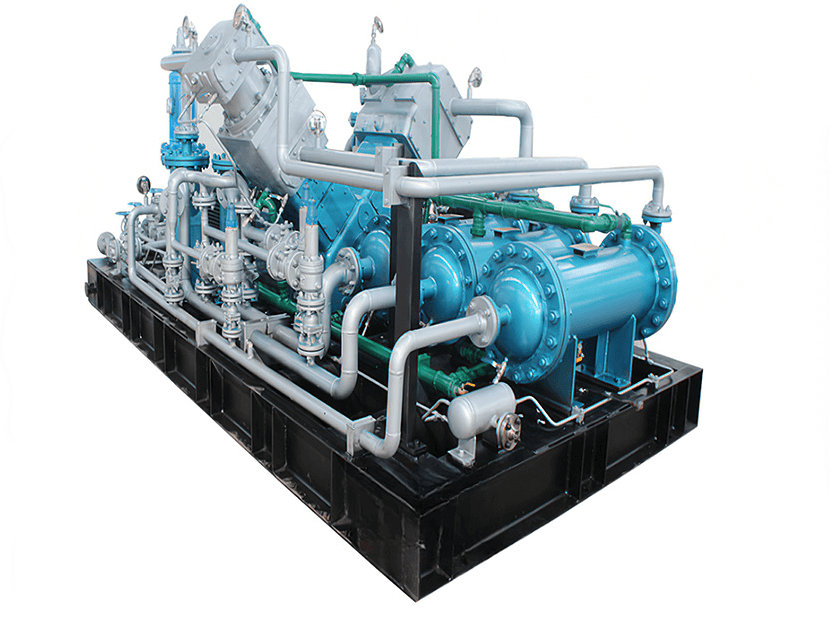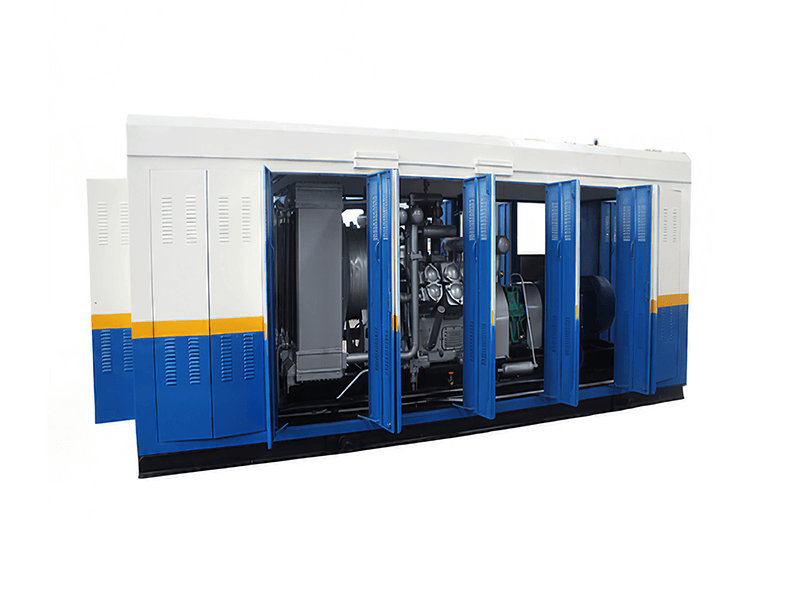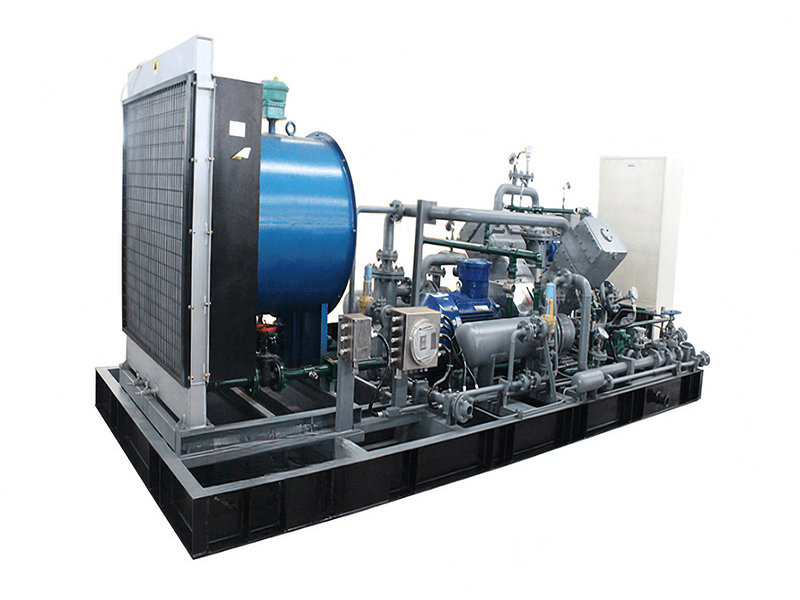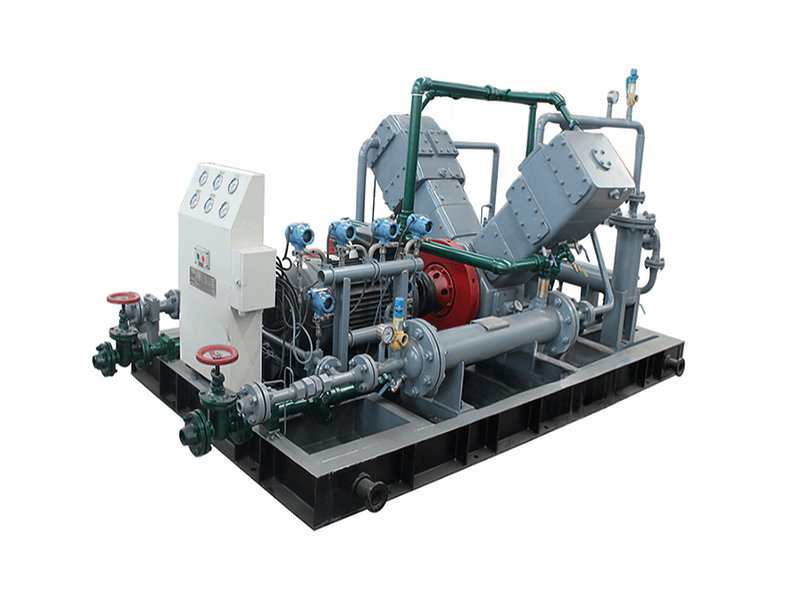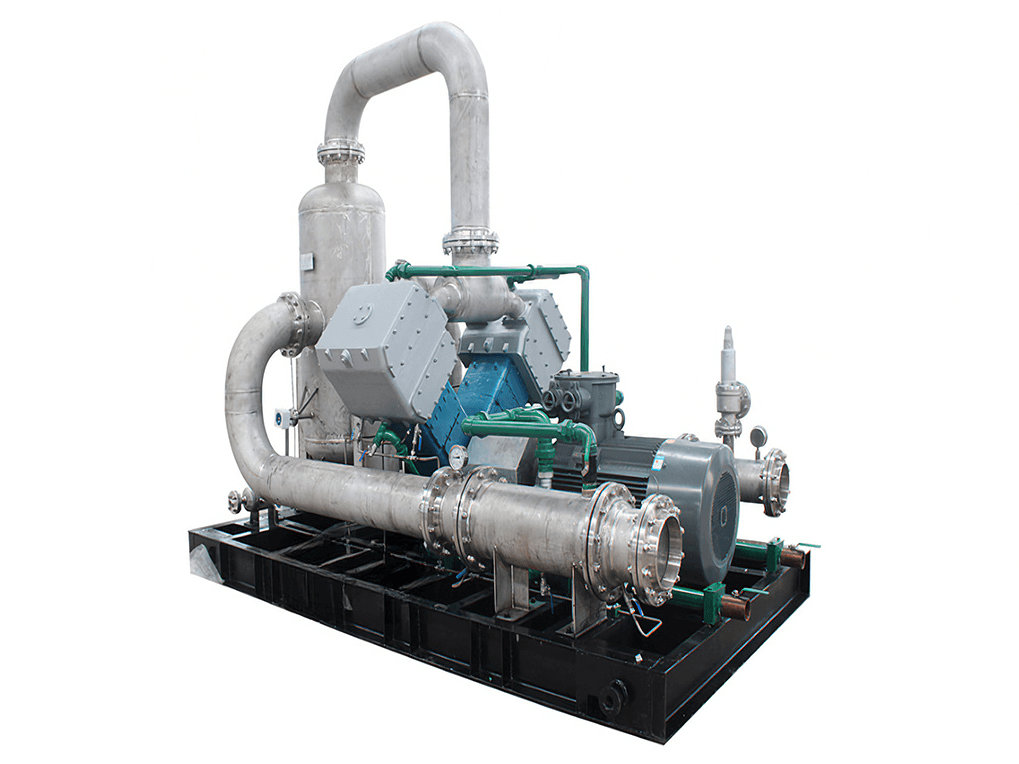Some key characteristics and types of hydrogen compressors
1. Reciprocating Compressors:
- Characteristics:
- Positive displacement: Reciprocating compressors use pistons and cylinders to compress hydrogen gas by displacing it through a reciprocating motion.
- High compression ratios: They can achieve high compression ratios, making them suitable for applications requiring high-pressure hydrogen gas.
- Compact size: Reciprocating compressors can be compact and have a relatively small footprint.
- Applications: Reciprocating compressors are commonly used in small-scale applications, such as hydrogen refueling stations, laboratories, and research facilities.
2. Diaphragm Compressors:
- Characteristics:
- Positive displacement: Diaphragm compressors use flexible diaphragms to displace hydrogen gas and compress it.
- Oil-free operation: They can operate without any lubricating oil, ensuring the purity of the compressed hydrogen gas.
- High compression ratios: Diaphragm compressors can achieve high compression ratios, enabling the compression of hydrogen gas to high pressures.
- Applications: Diaphragm compressors are used in industries such as chemical processing, hydrogenation reactions, and gas delivery systems.
3. Screw Compressors:
- Characteristics:
- Rotary motion: Screw compressors use two interlocking screws to compress hydrogen gas through a rotary motion.
- Continuous compression: They offer continuous and smooth compression, making them suitable for high-flow applications.
- Efficient operation: Screw compressors are known for their high efficiency and can handle a wide range of operating pressures.
- Applications: Screw compressors are used in various industries, including hydrogen refueling stations, oil and gas processing, and industrial applications requiring continuous and high-volume hydrogen compression.
4. Centrifugal Compressors:
- Characteristics:
- Dynamic compression: Centrifugal compressors use high-speed rotating impellers to impart kinetic energy to the hydrogen gas, which is then converted into pressure.
- Large capacity: They are capable of handling large volumes of hydrogen gas and are suitable for high-flow applications.
- Limited compression ratios: Centrifugal compressors are typically used for low to medium pressure applications, as their compression ratios are limited compared to other types.
- Applications: Centrifugal compressors are commonly used in large-scale industrial applications, such as hydrogen production plants, petrochemical refineries, and power generation.
5. Electrochemical Compressors:
- Characteristics:
- Solid-state operation: Electrochemical compressors use solid-state devices, such as electrochemical cells, to compress hydrogen gas.
- Compact and lightweight: They have a compact design and are lightweight compared to other compressor types.
- Quiet operation: Electrochemical compressors operate silently and have low vibration levels.
- Applications: Electrochemical compressors are suitable for portable and small-scale applications, such as fuel cell systems, micro-CHP (Combined Heat and Power) systems, and portable hydrogen generators.

Compare different types of hydrogen compressors based on several key factors
1. Operating Principle:
- Reciprocating Compressors: Use pistons and cylinders for positive displacement compression.
- Diaphragm Compressors: Utilize flexible diaphragms for positive displacement compression.
- Screw Compressors: Employ interlocking screws for rotary positive displacement compression.
- Centrifugal Compressors: Rely on high-speed impellers for dynamic compression.
- Electrochemical Compressors: Utilize electrochemical cells for compression.
2. Compression Efficiency:
- Reciprocating Compressors: Generally offer high compression efficiency and are well-suited for high-pressure applications.
- Diaphragm Compressors: Provide good compression efficiency and are suitable for moderate-pressure applications.
- Screw Compressors: Offer high efficiency and are particularly effective for high-flow applications.
- Centrifugal Compressors: Have relatively lower compression efficiencies but excel at handling large volumes of hydrogen gas.
- Electrochemical Compressors: Offer moderate to high efficiency depending on the specific electrochemical cell technology used.
3. Pressure Range:
- Reciprocating Compressors: Can achieve high-pressure compression up to several thousand psi.
- Diaphragm Compressors: Can handle moderate to high-pressure compression in the range of hundreds to thousands of psi.
- Screw Compressors: Suitable for a wide range of pressure requirements, from low to high pressures.
- Centrifugal Compressors: Primarily used for low to medium pressure compression.
- Electrochemical Compressors: Typically employed for low to moderate pressure applications.
4. Flow Capacity:
- Reciprocating Compressors: Offer a wide range of flow capacities, from low to high.
- Diaphragm Compressors: Generally suited for moderate flow rates.
- Screw Compressors: Provide high flow capacities and are suitable for high-volume applications.
- Centrifugal Compressors: Excel at handling large flow rates and are suitable for high-volume applications.
- Electrochemical Compressors: Typically used for low to moderate flow rate requirements.
5. Size and Footprint:
- Reciprocating Compressors: Can have a compact size and smaller footprint.
- Diaphragm Compressors: Generally have a compact size and require minimal space.
- Screw Compressors: Typically larger in size and can have a larger footprint compared to other types.
- Centrifugal Compressors: Tend to be larger and require more space due to their design and high flow capacity.
- Electrochemical Compressors: Usually have a compact and lightweight design, making them suitable for portable or small-scale applications.
6. Noise and Vibration:
- Reciprocating Compressors: Can generate moderate noise and vibration levels.
- Diaphragm Compressors: Operate quietly with low vibration levels.
- Screw Compressors: Generally produce moderate noise and vibration levels.
- Centrifugal Compressors: Can generate higher noise and vibration levels due to their high-speed operation.
- Electrochemical Compressors: Operate silently with minimal vibration.
7. Application Range:
- Reciprocating Compressors: Widely used in small to medium-scale applications such as hydrogen refueling stations, laboratories, and research facilities.
- Diaphragm Compressors: Suitable for chemical processing, hydrogenation reactions, and gas delivery systems.
- Screw Compressors: Commonly used in hydrogen refueling stations, industrial applications, and large-scale hydrogen compression.
- Centrifugal Compressors: Primarily employed in large-scale industrial applications such as hydrogen production plants, refineries, and power generation.
- Electrochemical Compressors: Typically used in portable and small-scale applications, such as fuel cell systems and portable hydrogen generators.
8. Maintenance and Reliability:
- Reciprocating Compressors: Generally require regular maintenance due to the presence of moving parts, such as pistons and valves. They may have shorter maintenance intervals and higher maintenance costs compared to other types.
- Diaphragm Compressors: Often have longer maintenance intervals and lower maintenance requirements due to their simpler design and absence of lubricating oil.
- Screw Compressors: Generally have longer maintenance intervals and lower maintenance requirements. They can offer reliable operation with minimal downtime.
- Centrifugal Compressors: Typically require regular maintenance due to the complexity of their design and higher speed operation. They may have longer maintenance intervals compared to reciprocating compressors.
- Electrochemical Compressors: Generally have low maintenance requirements due to their solid-state design and absence of moving parts.
9. Contamination and Purity:
- Reciprocating Compressors: May require additional purification systems to ensure the compressed hydrogen gas remains free from contaminants. They can be prone to oil carryover if not properly maintained.
- Diaphragm Compressors: Offer good gas purity as they can operate without lubricating oil, reducing the risk of contamination.
- Screw Compressors: Can deliver high-purity compressed hydrogen gas, especially when equipped with appropriate filtration systems. They are generally oil-free or have minimal oil carryover.
- Centrifugal Compressors: Require careful design and additional purification systems to maintain gas purity. Proper maintenance and filtration systems are crucial to avoid contamination.
- Electrochemical Compressors: Provide high-purity compressed hydrogen gas as they do not introduce any lubricants or contaminants during the compression process.
10. Energy Efficiency:
- Reciprocating Compressors: Can offer good efficiency, especially at higher pressures. Efficiency may decrease at lower operating pressures.
- Diaphragm Compressors: Typically provide good energy efficiency due to their positive displacement operation.
- Screw Compressors: Known for their high energy efficiency, especially in applications with high flow rates.
- Centrifugal Compressors: Generally have lower efficiency compared to positive displacement compressors. Efficiency can vary depending on the specific design and operating conditions.
- Electrochemical Compressors: Offer good energy efficiency, often comparable to other types of compressors, depending on the specific electrochemical cell technology used.
11. Cost:
- The cost of hydrogen compressors can vary depending on factors such as the type, size, capacity, and specific requirements of the application.
- Reciprocating compressors are often more affordable compared to other types, making them suitable for smaller-scale applications.
- Diaphragm compressors can have a moderate cost, depending on the size and pressure requirements.
- Screw compressors tend to have a higher initial cost due to their larger size and capacity.
- Centrifugal compressors are generally more expensive due to their complex design and high flow capacity.
- Electrochemical compressors can have varying costs depending on the specific technology and application requirements.
It's important to note that these points of comparison are general in nature and can vary depending on the specific design, manufacturer, and application considerations. When selecting a hydrogen compressor, it's crucial to evaluate the specific requirements of the application, including pressure, flow rate, purity, maintenance needs, energy efficiency, and budget, to make an informed decision.














